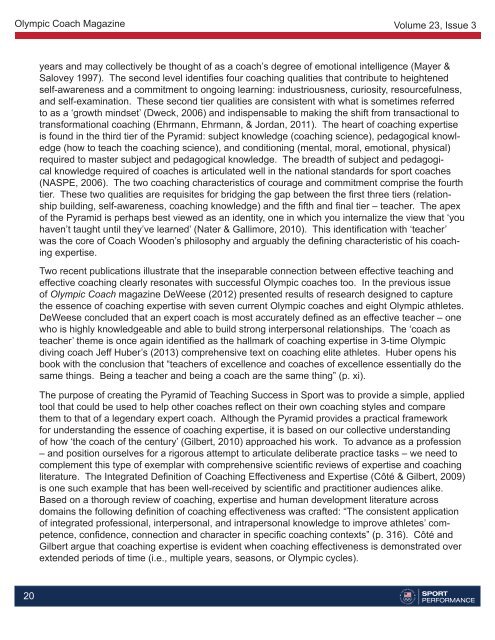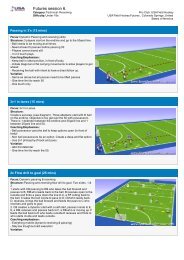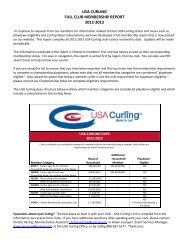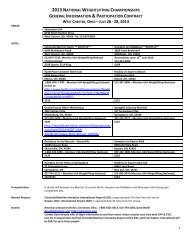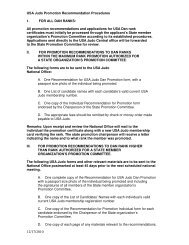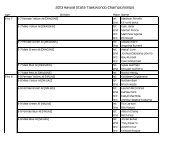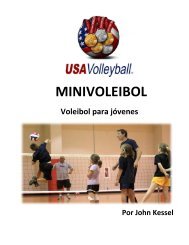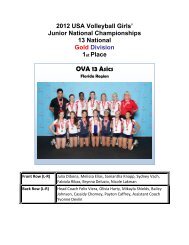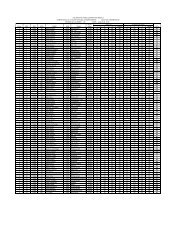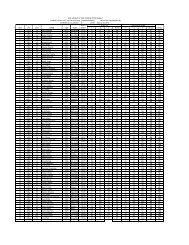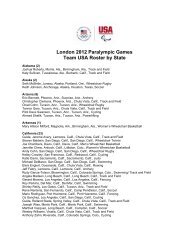OLYMPIC COACH - United States Olympic Committee
OLYMPIC COACH - United States Olympic Committee
OLYMPIC COACH - United States Olympic Committee
- TAGS
- olympic
- www.teamusa.org
You also want an ePaper? Increase the reach of your titles
YUMPU automatically turns print PDFs into web optimized ePapers that Google loves.
<strong>Olympic</strong> Coach Magazine<br />
20<br />
Volume 23, Issue 3<br />
years and may collectively be thought of as a coach’s degree of emotional intelligence (Mayer &<br />
Salovey 1997). The second level identifies four coaching qualities that contribute to heightened<br />
self-awareness and a commitment to ongoing learning: industriousness, curiosity, resourcefulness,<br />
and self-examination. These second tier qualities are consistent with what is sometimes referred<br />
to as a ‘growth mindset’ (Dweck, 2006) and indispensable to making the shift from transactional to<br />
transformational coaching (Ehrmann, Ehrmann, & Jordan, 2011). The heart of coaching expertise<br />
is found in the third tier of the Pyramid: subject knowledge (coaching science), pedagogical knowledge<br />
(how to teach the coaching science), and conditioning (mental, moral, emotional, physical)<br />
required to master subject and pedagogical knowledge. The breadth of subject and pedagogical<br />
knowledge required of coaches is articulated well in the national standards for sport coaches<br />
(NASPE, 2006). The two coaching characteristics of courage and commitment comprise the fourth<br />
tier. These two qualities are requisites for bridging the gap between the first three tiers (relationship<br />
building, self-awareness, coaching knowledge) and the fifth and final tier – teacher. The apex<br />
of the Pyramid is perhaps best viewed as an identity, one in which you internalize the view that ‘you<br />
haven’t taught until they’ve learned’ (Nater & Gallimore, 2010). This identification with ‘teacher’<br />
was the core of Coach Wooden’s philosophy and arguably the defining characteristic of his coaching<br />
expertise.<br />
Two recent publications illustrate that the inseparable connection between effective teaching and<br />
effective coaching clearly resonates with successful <strong>Olympic</strong> coaches too. In the previous issue<br />
of <strong>Olympic</strong> Coach magazine DeWeese (2012) presented results of research designed to capture<br />
the essence of coaching expertise with seven current <strong>Olympic</strong> coaches and eight <strong>Olympic</strong> athletes.<br />
DeWeese concluded that an expert coach is most accurately defined as an effective teacher – one<br />
who is highly knowledgeable and able to build strong interpersonal relationships. The ‘coach as<br />
teacher’ theme is once again identified as the hallmark of coaching expertise in 3-time <strong>Olympic</strong><br />
diving coach Jeff Huber’s (2013) comprehensive text on coaching elite athletes. Huber opens his<br />
book with the conclusion that “teachers of excellence and coaches of excellence essentially do the<br />
same things. Being a teacher and being a coach are the same thing” (p. xi).<br />
The purpose of creating the Pyramid of Teaching Success in Sport was to provide a simple, applied<br />
tool that could be used to help other coaches reflect on their own coaching styles and compare<br />
them to that of a legendary expert coach. Although the Pyramid provides a practical framework<br />
for understanding the essence of coaching expertise, it is based on our collective understanding<br />
of how ‘the coach of the century’ (Gilbert, 2010) approached his work. To advance as a profession<br />
– and position ourselves for a rigorous attempt to articulate deliberate practice tasks – we need to<br />
complement this type of exemplar with comprehensive scientific reviews of expertise and coaching<br />
literature. The Integrated Definition of Coaching Effectiveness and Expertise (Côté & Gilbert, 2009)<br />
is one such example that has been well-received by scientific and practitioner audiences alike.<br />
Based on a thorough review of coaching, expertise and human development literature across<br />
domains the following definition of coaching effectiveness was crafted: “The consistent application<br />
of integrated professional, interpersonal, and intrapersonal knowledge to improve athletes’ competence,<br />
confidence, connection and character in specific coaching contexts” (p. 316). Côté and<br />
Gilbert argue that coaching expertise is evident when coaching effectiveness is demonstrated over<br />
extended periods of time (i.e., multiple years, seasons, or <strong>Olympic</strong> cycles).


